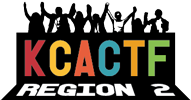Stage Directors and Choreographers (SDC) Directing Initiative
Stage Directors and Choreographers Society (SDC) Directing Initiative
SDC is an opportunity for students to explore the craft of directing with professional directors, educators, and peers. In Region II students participate in closed workshops with professionals in the field while showing work and receiving feedback.
One student director (either graduate or undergraduate) from each region will be selected to participate in the National Kennedy Center American College Theatre Festival in Washington D.C. each April. This award includes travel, lodging and per diem expenses, as well as attendance at KCACTF National Festival workshops and performances. Unique educational opportunities will be planned for the award recipients at the National Festival.
In addition, finalists receive a one-year Associate Membership in SDC. SDC underwrites the National Award(s), which is the result of a unique collaboration between SDC and KCACTF. Associate Membership in SDC introduces each regional finalist to the national community of professional stage directors and choreographers. Additionally, they receive the monthly E-Newsletter, a subscription to SDC Journal (the Union’s quarterly magazine), free or discounted admission to SDC Foundation’s events, and specially negotiated discounts. For more information about SDC, please visit the website at SDCWeb.org.
To be eligible for the SDC Directing Fellowship Program, a student must:
- Attend a school which has entered at least one production in the regional festival at either the associate or participating level;
- Be a bona fide student at the time of the regional festival;
- Be nominated by a faculty member at their school;
- Submit a completed registration packet via JotForm by December 18, 2023.
Application Requirements: DUE Monday December 18, 2023
- A Statement of Intent (1-page max.) addressing the reasons for your interest in the SDC Directing Initiative Program. Have you directed in the past? What successes and challenges have you faced? How will participating in this program contribute to your growth as a director? If you haven’t directed in the past, why are you interested in directing and what do you hope to learn in the program? Please affirm your ability to attend the festival in-person in Pittsburgh (Festival 56: Wednesday, January 24 through Saturday, January 27, 2024).
- Faculty/Nominator-of-Record Letter of Recommendation which speaks to the student’s directing accomplishments and potential. The letter should provide information about the student’s record as a student of directing, including coursework and practical directing experience, imagination and artistic vision, communication skills, and ability to collaborate with others. In addition, the letter should provide the faculty member’s assessment of how participation in this program may benefit the student. Please affirm the student director’s ability to attend the virtual festival. Nomination Letters may also be sent directly to directing@kcactf2.org or uploaded with the applicants submission.
- Choose one of the scenes from the list of SDC nationally selected scenes (here). Read the play the scene is from. Provide a concept pitch for the scene you will work on. This should be composed through the student speaking on a video. The video should be 5-7 minutes. Feel free to incorporate visual and audio references. You should address the following:
- Your directing philosophy and goals as a director.
- Why you chose this particular scene/play.
- What you are trying to achieve with your approach to this scene?
- How would you present a fully produced version of the play?
- What were your successes and challenges as a director.
Identification:
- Title of play, playwright, date of writing, date of publication, first production, production history, and relevant playwright biography.
- A simple, one sentence telling of the story.
- A metaphor that expresses the essence of the play.
Given Circumstances (of the play and the scene):
- Place.
- Time: Date: year, season, time of day.
- Environment: Social, Political, Cultural, Economic.
Plot (action/beats); Working Script:
- Explain your script divided into units of action and beats. Give a title for each beat.
- Detailed breakdown of the action. Separate the action into beats and provide an active present-tense verb for each character within each beat. (Example: A entraps and B pleads.)
- Indicate the key events for the scene (discoveries, complications, reversals,etc.)
Dramatic Action:
- Describe the scene’s basic conflict in a concrete sense.
(example: Edna wants Joe to join the striking cab drivers but Joe is afraid). - Provide a concise analysis of the events of the scene.
- Describe any significant previous action that occurs before the scene begins.
- Describe how this scene’s basic conflict integrates with the basic conflict of the play in an abstract sense. (example: Edna and Joe’s conflict reflects the basic conflict of Waiting for Lefty which is an exploration of the struggle of the working class against capitalist greed, etc.).
Character:
- List the characters, and provide an overall character breakdown and objective for the scene.
- Identify the obstacles between each of the characters and their objectives in the scene.
- How do the characters change over the course of the scene?
Language:
- Discuss how choice of words, images, phrases, sentence structures, the pace and sound of the dialogue, etc. reveal character, contribute to the storytelling and provide meaning within the scene.
Vision/Concept:
- What is the importance of the scene to the play as a whole?
- How does this scene reveal, highlight, detail, or expand upon one or more of the thought and/or ideas that the playwright intends to communicate to their audience through the play as a whole?
Spectacle/Design:
- Visual materials (ground plan, blocking diagrams, image portfolio, etc.)
- List a series of imagistic words (or other communication) that conveys your aesthetic sense of the look, sense and “feel” of
the scene and the play. These words could include colors, textures, ornamentation, relevant metaphoric images, light
and shadow, composition, degree of detail,etc.
Videos must be 200MB or less. Entries over this size limit will be disqualified. A good free online compression software is: https://www.freeconvert.com/video-compressor. Videos in mp4 format work best. Please note most iPhone files are much too big and should be compressed and converted.
Registration for Festival 56 is now open!!
Round 1 = Concept Pitches (outlined in Application Requirements)
Round 2= Direct a Staged Reading of NPP Finalists with precisely 2 hours of rehearsal. Directors may use music stands, chairs, and one prop. 1 hour of rehearsal time will be scheduled for the directors in the studio theatre space.
Contact

Danielle Drakes
she/her
SDC Directing
Towson University
